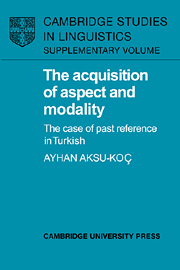Book contents
- Frontmatter
- Contents
- List of figures
- List of tables
- Acknowledgements
- Symbols and abbreviations
- PART I TENSE, ASPECT AND MODALITY IN ACQUISITION
- PART II DEVELOPMENT OF PAST REFERENCE IN TURKISH: FROM ‘PERFECT’ ASPECT TO ‘EVIDENTIAL’ MODALITY
- 4 The empirical study: rationale and hypotheses
- 5 Longitudinal study of early inflectional development
- 6 Experimental study of the production of the pasts of direct vs. indirect experience
- 7 Experimental study of the comprehension and metalinguistic awareness of the pasts of direct vs. indirect experience
- 8 Production and comprehension of the quotative function
- PART III CONCLUSIONS AND GENERAL IMPLICATIONS
- Appendix A
- Notes
- Bibliography
- Subject index
- Name index
6 - Experimental study of the production of the pasts of direct vs. indirect experience
Published online by Cambridge University Press: 23 September 2009
- Frontmatter
- Contents
- List of figures
- List of tables
- Acknowledgements
- Symbols and abbreviations
- PART I TENSE, ASPECT AND MODALITY IN ACQUISITION
- PART II DEVELOPMENT OF PAST REFERENCE IN TURKISH: FROM ‘PERFECT’ ASPECT TO ‘EVIDENTIAL’ MODALITY
- 4 The empirical study: rationale and hypotheses
- 5 Longitudinal study of early inflectional development
- 6 Experimental study of the production of the pasts of direct vs. indirect experience
- 7 Experimental study of the comprehension and metalinguistic awareness of the pasts of direct vs. indirect experience
- 8 Production and comprehension of the quotative function
- PART III CONCLUSIONS AND GENERAL IMPLICATIONS
- Appendix A
- Notes
- Bibliography
- Subject index
- Name index
Summary
The experimental study was designed to shed further light on the processes of differentiation of the tense-aspect-modality functions of the two past inflections. Experimentally controlled production and comprehension data were obtained from older children, assessing the role of aspectual and modal variables on the differential use of the two forms.
Experimental assessment of performance with given linguistic structures at a later development point than their time of acquisition, is grounded on the assumption that relative performance with respect to different forms within the same age range reflects relative acquisition time. Different problems inherent in the experimental paradigm generally lead to either an underestimation or an overestimation of the age of acquisition (Karmiloff-Smith, 1979a, 1981). Age-related findings in the context of the present experiments thus have to be evaluated accordingly. Furthermore, these are not designed to tap age of acquisition – which the longitudinal data has revealed to be quite early – but rather to find out more about the underlying processes in the structuring of a given semantic domain.
In the next section, the overall design of the experimental study will be presented. The remaining parts of the chapter will concentrate on the production experiments. Studies concerning the comprehension of the inferential-past and the production and comprehension of the quotative function are dealt with in Chapters 7 and 8, respectively.
Overall design of the experimental cross-sectional study
Subjects
The subjects were sixty normal, monolingual children from middle-class backgrounds.
- Type
- Chapter
- Information
- The Acquisition of Aspect and ModalityThe Case of Past Reference in Turkish, pp. 105 - 135Publisher: Cambridge University PressPrint publication year: 1988

